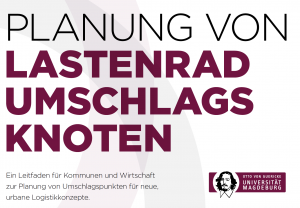Cargo bikes are emission-free, environmentally friendly and low-noise vehicles. Cargo bikes can be effective and economically sound city logistics concepts especially for the growing number of small shipments. The German Federal Ministry of Transport and Digital Infrastructure (BMVI) set a target of 20% cargo bikes in city logistics.
Cargo bikes as part of city logistics require careful urban planning. Knowledge about the variety, functions and special features of cargo bikes is needed. Many pilot projects in amongst others German cities show cargo bikes can be implemented successfully. But, at local authorities, a generalized urban planning process is missing.
The project “Lastenraddepot” by a research team from the Otto von Guericke University Magdeburg answers questions about the implementation of transshipment nodes (micro hubs) for cargo bikes in urban areas. The team developed a handbook for urban planners. The German handbook provides a basic overview of cargo bikes in city logistics chains, a general planning process for implementation of micro hubs and recommendations from logistic, traffic and recommendations for long-term planning.
The handbook focuses on the fast-growing courier, express and parcel market. However, the lessons learned can be transferred to other segments as well.

